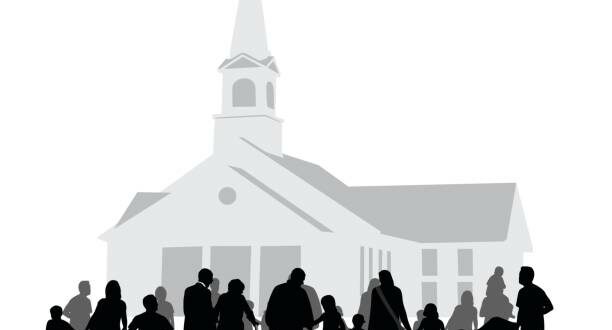A young man went to enlist in the Army and was accepted. They told him to report for basic training on a specific date at Fort Benning, Georgia. He informed the recruiting officer, “I don’t plan to attend basic training. I will train here at home by myself.” The officer told him, “You are in the Army now. You will report for duty as instructed.”
A young student signed up for the school band. The Band Director told him to attend practice the next Monday morning at 9:00. He replied that he was not planning to attend. He would just practice at home. The director quickly told him he would either show up at the designated time or not be in the band.
A young person accepted Christ. The counselor instructed him to attend church regularly for instruction, worship, and fellowship. He objected. I will get my teaching with an online course, worship via TV, and fellowship with Christians wherever I meet them. The Christian worker told him, “Well, that’s ok. Read your Bible and pray every day.”
Sorry to say, this is where a lot of Christianity is today. The Army and the school band require discipline, but the church is only an optional event. If the new Christian has this attitude, is he genuinely born-again? Does anybody instruct new Christians that they joined the Army of the Lord?
What does the word “Church” mean? The Greek word for church, “ekklesia,” means “called out ones.” It is an assembly that could be a group gathered in a specific location for one particular purpose. It could be a group of citizens discussing state affairs. In Act 19, it is used to describe a riotous mob. However, in most cases in the New Testament, it refers to a local church.
In a few Scriptures, the word church applies to all born-again believers since Christ founded the church. It is described by the terms “body of Christ” (I Corinthians 12, Romans 12, Ephesians 4, Colossians 1), or the bride Ephesians 5, and Revelation 21 and 22. In Hebrews 12:23, the words “general assembly” and “church of the firstborn” are connected as the total church assembled in heaven with the Old Testament saints. This assembly is the only time that the entire “body of Christ” is assembled, thus fulfilling the definition of the church as a called-out assembly.
Other than the above-mentioned Scriptures, the word “church” refers to a local body of “called out” baptized believers meeting in one locality, and they are all visible to each other. The word “church” is used 77 times in the New Testament, and “churches” an additional 37 times.
Jesus said in Matthew 16:18, “I will build my church.” He gave the Great Commission to the church in Matthew 28:18-20. In Ephesians 5:25, husbands are commanded to love their wives “even as Christ also loved the church and gave himself for it.”
Note the prominence of the local church in the New Testament: the books of 1 and 2 Corinthians, Galatians, Ephesians, Philippians, Colossians, and 1 & 2 Thessalonians are written as instructions to specific local churches. Paul wrote 1 & 2 Timothy and Titus to two preachers giving instructions for local church ministry. Paul writes the book of Romans to all the believers in Rome. He finishes with commendations for specific fellow laborers in specific local churches. The book of Acts is the manual for local church activity in Jerusalem and the missionary activity of planting churches. Paul planted churches wherever he could. James 2 addresses specific behaviors in churches that required correction. Hebrews 10:25 commands, “Not forsaking the assembling of yourselves together.” The book of Revelation contains seven letters from Christ to seven specific local churches.
The church is God’s plan for spreading the gospel. If the local church is this important to Jesus, Paul, all the apostles, Timothy and Titus, and countless others mentioned in the New Testament, shouldn’t it be important for you?
Why should I attend church?
It is commanded in Hebrews 10:25. “Not forsaking the assembling of yourselves together, as the manner of some is: but exhorting one another: and so much the more as ye see the day approaching.” The writer says we should not only attend but should also encourage other Christians to do the same. There is also an urgency – as you see the day approaching. That day could be next Sunday, but it probably refers to the Lord’s coming. He could come anytime soon: therefore, urge Christians to be in the Lord’s house.
Why should I attend? In Acts 2:42, the early Christians met for (1) doctrine (teaching of the Word), (2) fellowship (we have Christ and our beliefs in common), (3) breaking of bread (the Lord’s supper), and (4) prayers.
Every Christian (new Christian or mature Christian) needs doctrinal teaching from the pastor or other qualified teachers in the church.
Jesus said, “By this shall all men know that ye are my disciples, if ye have love one to another” (John 13:35). You get to know each other and love each other as you fellowship.
When you have times of sickness, trouble, distress, heartache, or grief, you can’t call on the TV pastor. But you can call for your church pastor and your church friends.
The breaking of bread – the Lord’s Supper – is an essential reminder of Christ’s sacrifice for our sins.
Prayers – in times of trial, you need the prayers of a pastor or Christian friends who know and love you. You can ask for their prayers because you have already fellowshipped and prayed with these Christians. They know you. Likewise, you can pray for each of them in their needs.
The local church is also where you serve fellow members and minister to people outside the church. It is the place where you exercise your spiritual gifts.
Most of all, you should attend church regularly because you love the Lord and want to obey Him.
 The Bottom Line, Ministries Christian News, Articles, & Poetry
The Bottom Line, Ministries Christian News, Articles, & Poetry 





Great article sir
This was a wonderful fountain of spiritual knowledge.
Excellent piece Dale!
God Bless~
Thank you CD! I appreciate your encouragement.
Thank you, Matthew.
At a time when church attendance is at an all-time low, this is a much needed article. Also, it is a very comprehensive explanation for why people need to be involved in a local church.